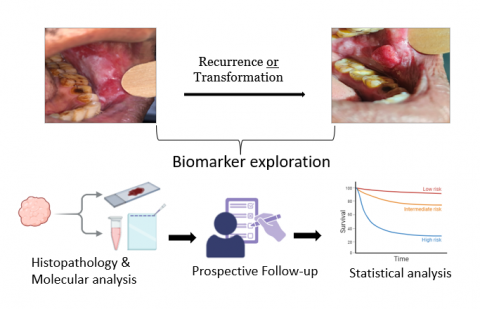Oral cancer has a well-documented long preclinical phase, starting with an oral pre-invasive lesion (OPL) which progresses from hyperplasia through the increasing degrees of dysplasia, and finally develops into invasive oral squamous cell carcinoma (OSCC). Identification and management of potentially premalignant oral epithelial lesions at the highest risk of malignant transformation hold great promise for successful secondary prevention of OSCC, potentially reducing oral cancer morbidity and mortality. A wide range of molecular aberrations associated with the progression of OPL to squamous cell carcinoma has been reported, in addition, previous laboratory studies on genome-wide profiling of gingivobuccal leukoplakia and OSCC revealed that specific chromosomal alterations are associated with OPL progression. Hence, we have proposed analysis of these altered chromosomal loci/ underlined genes in clinically high-risk oral leukoplakia patients which will help in better stratification of the high-risk lesions that have the potential to transform. The proposed study will be carried out by using Nano-String analysis; the results of which will be validated by real-time PCR. As oral carcinogenesis is a multifactorial process in which both environmental and genetic factors contribute the disease development. Among the environmental risk factors use of tobacco is the major contributor to the disease. Limited information exists about the comprehensive role of tobacco habits and molecular genetic alterations in the development of oral precancerous lesions which is another aim of the present study.
Lab members:Ms Rinal Chavda, Mr Adesh Takawale, Mr Kiran Sain
Co-Principal Investigator:Dr Sharmila Pimple
Co-Investigators: Dr Asawari Patil, Dr Swapnil Rane, Dr Neha Mittal, Dr Gauravi Mishra, Dr Pankaj Chaturvedi, Dr Prathmesh Pai, Mrs Sadhana Kannan


